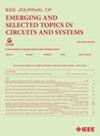通过直接最小化矩阵-矢量乘法误差为模拟内存计算内核编程权重
IF 3.7
2区 工程技术
Q2 ENGINEERING, ELECTRICAL & ELECTRONIC
IEEE Journal on Emerging and Selected Topics in Circuits and Systems
Pub Date : 2023-11-01
DOI:10.1109/JETCAS.2023.3329449
引用次数: 0
摘要
模拟内存计算(AIMC)内核中非易失性存储器(NVM)设备的精确编程对于在深度学习推理工作负载中实现高矩阵向量乘法(MVM)精度至关重要。在本文中,我们提出了一种新颖的编程方法,通过使用合成随机输入数据执行随机梯度下降优化,直接最小化 MVM 误差。与传统的逐单元迭代编程相比,MVM 误差大幅降低。我们证明,我们方法中的最优超参数与所编程的权重无关,因此无需进一步微调即可在多个 AIMC 内核上进行大规模部署。在编程过程中,它还无需使用高分辨率模数转换器 (ADC) 来破译小单元电导。我们通过实验验证了这种方法,证明在 ResNet-9 上的推理精度提高了 1.26%。实验采用基于相变存储器 (PCM) 的 AIMC 内核,以 14nm CMOS 技术制造。本文章由计算机程序翻译,如有差异,请以英文原文为准。
Programming Weights to Analog In-Memory Computing Cores by Direct Minimization of the Matrix-Vector Multiplication Error
Accurate programming of non-volatile memory (NVM) devices in analog in-memory computing (AIMC) cores is critical to achieve high matrix-vector multiplication (MVM) accuracy during deep learning inference workloads. In this paper, we propose a novel programming approach that directly minimizes the MVM error by performing stochastic gradient descent optimization with synthetic random input data. The MVM error is significantly reduced compared to the conventional unit-cell by unit-cell iterative programming. We demonstrate that the optimal hyperparameters in our method are agnostic to the weights being programmed, enabling large-scale deployment across multiple AIMC cores without further fine tuning. It also eliminates the need for high-resolution analog to digital converters (ADCs) to decipher the small unit-cell conductance during programming. We experimentally validate this approach by demonstrating an inference accuracy increase of 1.26% on ResNet-9. The experiments were performed using phase change memory (PCM)-based AIMC cores fabricated in 14nm CMOS technology.
求助全文
通过发布文献求助,成功后即可免费获取论文全文。
去求助
来源期刊

IEEE Journal on Emerging and Selected Topics in Circuits and Systems
ENGINEERING, ELECTRICAL & ELECTRONIC-
CiteScore
8.50
自引率
2.20%
发文量
86
期刊介绍:
The IEEE Journal on Emerging and Selected Topics in Circuits and Systems is published quarterly and solicits, with particular emphasis on emerging areas, special issues on topics that cover the entire scope of the IEEE Circuits and Systems (CAS) Society, namely the theory, analysis, design, tools, and implementation of circuits and systems, spanning their theoretical foundations, applications, and architectures for signal and information processing.
 求助内容:
求助内容: 应助结果提醒方式:
应助结果提醒方式:


